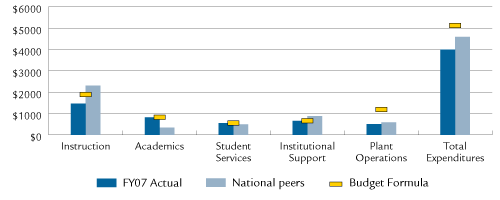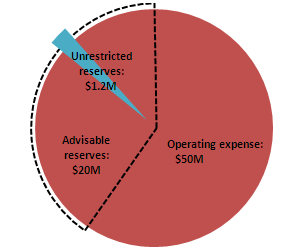Massasoit Community College
Massasoit Community College (MCC) is a comprehensive two-year college that offers a quality education leading to associate degrees in arts and sciences, as well as one-year certificate programs. Career and transfer programs provide a variety of educational opportunities that prepare students for life, leadership, and work. With campuses in Brockton and Blue Hills/Canton, the College offers opportunities in a variety of liberal arts, allied health, engineering technologies, and business fields of study.
Program of Distinction
Collaborations
Access Indicators
Affordability Indicators
Student Success and Academic Quality Indicators
Fiscal Effectiveness and Efficiency Indicators
Program of Distinction
In 2008, Massasoit was one of seven recipients of the Department of Higher Education's Simulation Technology in Nursing Education and Practice grant awards to provide human simulation equipment and software. The equipment is shared with and housed at New England Sinai Hospital, the college's clinical partner in the initiative. The sophisticated teaching and learning tool is enabling Massasoit's nursing and respiratory care students and faculty to practice assessments and interventions in a realistic patient-care setting, thereby enriching both classroom instruction and clinical experiences. It is also providing ongoing professional development opportunities to the hospital's nursing and respiratory staff. As a result of the partnership, more than 200 students and 280 staff members are able to practice and perfect not only their clinical techniques, but also their leadership, teamwork and communication skills.
Collaborations
- MCC was awarded a $300,000 grant to offer the nationally recognized Gateway to College program for at-risk and dropout youth. Developed by Portland (OR) Community College, the Gateway program provides at-risk high school students an opportunity to attain their diploma while simultaneously working toward an associate's degree. In fiscal year 2008, Massasoit's program served 55 students from Boston and Brockton, and the partnership is expanding in the coming year to include other area high schools. Gateway to College is part of a national initiative to launch 200 Early College High Schools by 2010 and is funded by the Bill & Melinda Gates Foundation, the Carnegie Corporation of New York, the Ford Foundation and the W. K. Kellogg Foundation.
- MCC's Mathematics Department and the Student Assessment Department hosted a visit with the Braintree High School mathematics staff to discuss the roles of MCAS and Accuplacer in determining student placement in mathematics. Also, a presentation was made regarding a formal study by a Massasoit faculty member on MCAS and Accuplacer. The Braintree teachers then sat for an Accuplacer session in which they took the test and received an estimate of placement. The program provided insights into the uses and shortcomings of both Accuplacer and MCAS in diagnosing student needs.
- Massasoit and Stonehill College are in the third year of a collaborative effort funded through a National Science Foundation STEP grant (Science, Technology, Engineering, and Mathematics Talent Expansion Program) entitled, "Recruitment and Retention of Chemistry, Biochemistry and Biology Majors from Traditional and Non-Traditional Sources," the purpose of which is to increase transfer for STEM students from two- to four-year colleges. Included are summer research programs on both campuses, identification and mentoring of potential transfers students, career and transfer information and tutoring at Massasoit.
- The College's Stoughton ABE Program has become a well-known and effective resource for the community of Stoughton. Funded by DESE and administered by the College, the program provides six ESL classes for 80 Stoughton residents, with 200 more on a waiting list. The program is a strong collaborative partnership among the college, Stoughton Public Schools, Stoughton Library, Stoughton Youth Commission, the Stoughton Chamber of Commerce and the Stoughton Board of Selectmen.
- Collaboration among the College's instructional and administrative departments and the Division of Capital Asset Management (DCAM) is furthering a number of new sustainability projects. One example is the decision to drill a test geo-thermal well on the Canton Campus which would heat and cool the campus in its entirety or in conjunction with traditional systems. The geo-thermal initiative is being integrated into academic programs. A similar effort is underway with photo voltaic arrays which would provide useful energy by converting sunlight to electricity. Again, the study is a valuable teaching tool for a number of subject areas, chiefly electrical engineering technology, HVAC, architectural technology and physics.
- Sponsored by the Downtown Brockton Higher Education Training Center, MCC provided training at the Career Center on customer service, leadership and sexual harassment for twenty-five participants from area businesses. Promotion was provided by the College, the Chamber of Commerce and Workforce Investment Board.
Section I: Access to Public Higher Education in Massachusetts
Access Indicators
Fall 2007 Enrollment
| Headcount |
7,064 |
| FTE |
4,302 |
Fall Enrollment
Over the last three years, fall headcount enrollment has increased 5.3%.
Over the last three years, fall full-time equivalent (FTE) enrollment has increased 5.4%.
Annual 2007–2008 Enrollment
| Headcount |
10,614 |
| FTE |
4,504 |
Annual Enrollment
Over the last three years, annual headcount enrollment has increased 4.6%.
Over the last three years, annual FTE enrollment has increased 4.3%.
Looking Back: Fall and Annual Headcount Enrollment

Fall 2007 Minority Enrollment
24%
Minority Enrollment
Lower than the minority representation of the institution's primary draw cities and towns (27.8%) but greater than the Southeast Region's minority representation of 10.8%.
Section II: Affordability of Massachusetts Community Colleges
Affordability Indicator
2007–2008 Tuition and Fees as a Percent of Median Family Income
4.2%
% of Median Family Income
Below the Northeast regional average of 4.9%.
Looking Back: Tuition and Fees as a Percent of Median Family Income
|
FY2004 |
FY2005 |
FY2006 |
FY2007 |
FY2008 |
| Massasoit Community College Tuition and Fees |
$3,330 |
$3,330 |
$3,330 |
$3,330 |
$3,330 |
| State Median Family Income |
$67,527 |
$68,701 |
$71,655 |
$74,463 |
$78,497 |
| "X" as a Percent of State Median Family Income |
| X = Massasoit Community College Tuition and Fees |
4.9% |
4.8% |
4.6% |
4.4% |
4.2% |
| X = Massachusetts Community Colleges' Average Tuition and Fees |
4.8% |
4.9% |
4.9% |
4.7% |
4.7% |
| X = Northeast Average Tuition and Fees |
|
4.8% |
4.8% |
4.9% |
4.9% |
Section III: Student Success and Academic Quality
Success and Quality Indicators
Fall 2006 Cohort First-Year Persistence Rate
| Retained at original institution |
54.9% |
| Retained at any institution |
64.4% |
Fall Cohort First-Year Persistence
Persistence at original institution has decreased 2.4 percentage points over the last three years and is below the segmental average of 56.5%.
Looking Back: Fall-to-Fall First-Year Persistence Rate

Fall 2003 Cohort Four-Year Overall Success Rate
69.7%
Fall 2003 Cohort Four-Year Individual Success Rates
| Earned Degree/Certificate |
30.7% |
| Transferred |
15.7% |
| Earned 30 Credits |
21.4% |
| Still Enrolled |
1.9% |
| Note: Each subsequent category excludes any student included in previous category(ies) |
Fall Cohort Four-Year Overall Success Rate
This new indicator measures students who have earned a degree/certificate, transferred to another institution, earned 30 or more credits, or are still enrolled after four years. Future reports will include these outcomes over four, five, and six years for this and successive cohorts. Please see the Technical Guide for further details regarding this indicator.
2007–2008 Fall-to-Spring Retention Rate
92.2%
Fall-to-Spring Retention Rate
Fall-to-spring retention has remained relatively stable over the last three years.
FY2008 Credit Course Completion Rate
76.9%
Course Completion
Above the Board of Higher Education's target rate of 75%.
Total Degrees Conferred in FY2008
881
Degrees Conferred
Average degrees conferred per year over the last three years: 854
Looking Back: Degrees Conferred

2007 Pass Rate on the National Nursing Licensure Examination
93.1%
Nursing Exam Pass Rate
Above the Board of Higher Education's target pass rate of 85%.
FY2008 Annual Enrollment in Workforce Development Courses
4,666
Workforce Development
Average annual enrollment in workforce development courses per year over the last three years: 4,233
Section IV: Effective and Efficient Use of Resources
Effectiveness and Efficiency Indicators
Effective Projects and Initiatives
- Leading by Example awarded $18,000 for trash compactor for single stream recycling program. This will save the college $20,000 a year.
- Established Sustainability Task Force Committees comprised of 50 volunteers from faculty, administration, staff, and students. Massasoit was highlighted for these efforts in the Governor's report and EOEEA report.
- Negotiated with ENERNOC to participate in the Energy Demand Response which brings the college $11,000 in funding each year.
Resource Allocation
Expenditures per Student—Actual, National Peers, and Budget Formula

Note: This graphic was revised on May 6, 2009. The previously posted graphic displayed the data inaccurately.
FY2008 Primary Reserve Ratio
| Unrestricted Reserves (UR) |
$1,282,374 |
| Total Operating Expenses (TOE) |
$50,077,761 |
| Primary Reserve Ratio (UR/TOE) |
2.6% |
Primary Reserve Ratio

Compliance
No materials weaknesses based on annual external independent audit:

